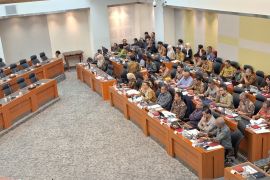"According to the WHO (World Health Organization), the cause of obesity is too much eating, so excessive calorie intake. One which contributes to this obesity is sugar," the lead of innovation, research, and development at PERSAGI, Marudut Sitompul, said during a meeting with the House of Representatives here on Thursday.
According to Sitompul, sugar is not the sole contributor to diabetes. He cited the 2014 Total Diet Survey, which showed that Yogyakarta residents consumed the most sugar, yet Jakartans had the highest diabetes rate.
Recently, global research has pointed to the correlation between heavy metal consumption and obesity, he informed. He pointed to fried street foods that often come wrapped in old printed papers.
Such foods are high in fat, and the ink in the paper wrapping can also come in contact with the foods, he said. This ink can contain lead (Pb), he added.
He stressed that obesity leads to diabetes and other non-transmissible diseases, hence it must be prevented by educating everyone about it. He also highlighted the importance of educating people about consuming a balanced diet tailored to their age, sex, weight, and height.
He further said that PERSAGI has also recommended several things, such as the harmonization of existing regulations regarding the limits for sugar, salt, and fat; a further study on food and drink ingredients reformulation; and the monitoring of street foods.
It has also called for a comprehensive study on the correlation between the tax on products with sugar, salt, and fat content and the number of diabetes mellitus cases, he said.
The head of PERSAGI's central management board, Rudatin, said that the 2023 National Health Survey (SKI) showed a huge increase in the obesity rate among adults aged 18 and up. Moreover, toddlers have started getting obese, she noted.
"Nutritional issues in Indonesia is not just stunting. There are (also the issues of) underweight, wasting, and even obesity. And obesity has begun to affect children," Rudatin added.
Related news: Ministry outlines three strategies to tackle obesity in Indonesia
Related news: Media role crucial for shifting habits to tackle obesity: ministry
Reporter: Mecca Yumna Ning Prisie
Editor: Rahmad Nasution
Copyright © ANTARA 2024











